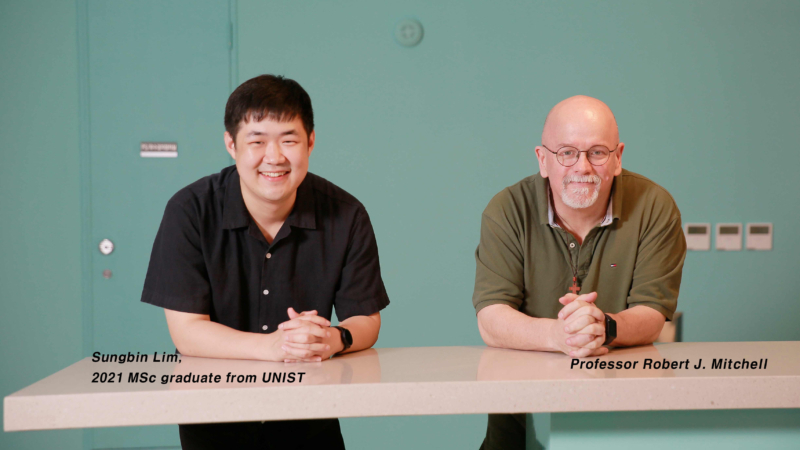Sungbin Lim, a former graduate from the Department of Biological Sciences at UNIST, is excited to begin the next chapter in his life. He has recently been accepted into a Ph.D. program at the International Max Planck Institute for Evolutionary Biology (MPI for EvolBio), The program starts from September 2022.
Mr. Lim first heard about the program, while searching for an institute that has Ph.D. programs focused on studying experimental evolution of bacteria. He then found the MPI for EvolBio was annually collecting Ph.D. students through the International Max Planck Research School (IMPRS) course on its website and applied immediately.
IMPRS managed by MPI for EvolBio is an international graduate school dedicated to highest level research and training in all areas of contemporary evolutionary biology. Founded in 2010, this is also a joint initiative between the Max Planck Institute for Evolutionary Biology in Plön, the Christian Albrechts University and the Helmholtz Center for Ocean Research (GEOMAR) in Kiel.

Sungbin Lim, 2021 MSc graduate from UNIST, has recently been accepted into a Ph.D. program IMPRS of MPI EvolBio, Germany. l Image Credit: Kyoungchae Kim
Mr. Lim obtained his Master’s Degree in September 2021 under the mentorship of Professor Robert J. Mitchell in the Department of Biological Sciences at UNIST. During his school years at UNIST, he was involved in research related with microbiology – particularly how bacteria interact with other bacteria and environmental factors.
One of the projects he conducted was researching prey-predator interactions under various natural conditions, such as microfluidic or starved conditions. He used Bdellovibrio bacteriovorus, a predatory bacterium, and Escherichia coli as its prey. Moreover, he opened his own project studying the delivery mechanism of prodigiosin, an antibiotic pigment produced by Serratia marcescens. His research experience helped him to train as a microbiologist and encouraged him to find his own interests in microbiology.

Sungbin Lim earned his Master’s degree in 2021 under the mentorship of Professor Robert J. Mitchell in the Department of Biological Sciences at UNIST. From left are Professor Mitchell and Sungbin Lim. l Image Credit: Kyoungchae Kim
When asked about what being accepted to a Ph.D. program at MPI for EvolBio had meant to him, Mr. Lim said, “I am thrilled to begin the next chapter in my life at Max Planck Institute for Evolutionary Biology.” He added, “I am very fortunate to have Professor Mitchell as my mentor, as he has been extremely supportive and given me great guidance throughout my academic years at UNIST. I would like to follow the path of my mentor and continue to excel in my research career.”
“Sungbin is a hardworking and high-achieving individual who enjoys taking on new challenges and learning new skills,” says Professor Mitchell. “I am very proud of what he has achieved and confident he will do an excellent job.”
At IMPRS, Mr. Lim will join Dr. Jenna Gallie’s research group, carrying out research of contemporary evolutionary biology in various aspects. In particular, he will be studying the evolution of translation termination within bacteria. He also plans to widen his research topics with evolutionary biology by merging multiple disciplines together. He hopes to later open his own lab as a professor and continue to study evolutionary theory using microbiological, mathematical and computational models. As MPI for EvolBio currently hosts many experts in these areas, Mr. Lim thinks he is on the best route to realize his plans.
[Q&A with Sungbin Lim, 2021 MSc Graduate from UNIST]
Q. Please introduce yourself briefly?
I earned a Bachelor’s degree and a Master’s degree from the Department of Biological Sciences, Ulsan National Institute of Science and Technology in 2019. I was in Professor Robert J. Mitchell’s lab, majoring microbiology. My research interests lie in microbiology, especially bacteria and their interaction, which mainly conducted in laboratory.
Q. What made you study at UNIST and particularly work in Professor Mitchell’s lab?
When I was joined to UNIST in 2013, the university was very young and innovative. I was attracted to the university’s unique and practical curriculum raising young scientist (e.g., Dual major, English, Internship course, Excellent professors, etc.). I was not sure in what detailed subject I was interested in, but I was certain that I will be able to find out my interest during studying in UNIST.
Microbiology was super interesting for me, and I enjoyed Prof. Mitchell’s microbiology course as he gave us chance to think wider and raise questions during the class. I started internship course in his laboratory and after graduation, I joined his lab for master’s student. The reason I joined in his group is not only my interest of microbiology, but because I liked the way he organizes the research. Most of case, he supports the student to pursue their own interests of microbiology even if it can be apart from the main theme of the group. Thus, I thought if I join the group, I can be trained as a microbiologist (by participating the main research of group) and get a chance to study my detailed interest in microbiology.
Q. Why do you think your research is important and worth doing?
We can explain the importance of those research by its academical value and industrial value. In academical point of view, B. bacteriovorus is interesting as they are using so sophisticated predation mechanism which are orchestrated precisely during predation process. This mechanism is enough interesting to understand itself. How does this mechanism being controlled? Why is this bacteria established so complicated system, not just using simple nutrient consumption process? How does predation activity changes within various conditions, which can be observed in real nature? Can we actually recapitulate specific behavior of B. bacteriovorus in real nature into laboratory by properly designing the experiment? So many inspiring questions can be easily raised and yet none of the questions has been clearly answered.
Also, in industrial point of view, B. bacteriovorus shows wide range prey predation, including pathogens which are causing many serious clinical issues. One of the biggest challenge that pathogen shows currently is that they are getting resistant to antibiotics, which are conventional strategy for human to fight against pathogen. Many studies showed that predation with B. bacteriovorus does not raise resistance. Thus, these predatory bacteria are getting focus as next-generation antibiotics that attacks wide range of pathogen and preventing occurrence of resistant pathogen at same time. Although there many steps remained for practical application, we are trying to progress it step-by-step. Our group is targeting both is academical and industrial value of B. bacteriovorus using various experimental techniques and approaches, so I am really proud of what our group is doing.
In terms of my other research topic, Serratia marcescens and delivery mechanism prodigiosin, I was more focused about its academical interest. The question was simple – How does the bacteria deliver its hydrophobic chemical to attack other bacteria in aqueous condition? Although one of the previous research projects from our group which I also participated showed that membrane vesicles can be one route, my research demonstrated that there is surely another route. Although the detailed molecular mechanism and principle of direct contact mediated delivery remained unknown, the study is certainly inspiring as it suggests there will be something we can know further.
Q. Tell us about your college life at UNIST?
UNIST provides wide chances for the student who wants to be a scientist. This includes, but is not limited to, informative courses and excellent faculty. But, I also want to emphasize that student can take discussion focused lectures which train students to actively communicate. I strongly recommend to actively participate in the lecture so that students can train themselves to think fast and scientifically. I have been immensely supported by my advisor Professor Mitchell and the members of our research group.
Q. What is your research interest? And what are you hoping to research?
My main research interest is experimental evolution of microbe. I believe that bacteria is one of the most attractive model organism to conduct evolution experiment as they allow us to deal with large population and generation. I want to study the principle of evolution in nature by partially recapitulating it into laboratory using microbes. As current innovation of analytical techniques and bioinformatics gave us better chance of understanding bacteria community, I believe experimental evolution will show strong synergetic effect.
I am planning to study evolution of tRNA and translation system of bacteria, but my another interest is acquisition of new phenotype or social behavior of bacteria. How do bacteria get complex, effective in community level even though they do not aware about their community consciously? In my current knowledge, it will require combination aspect of population dynamics, genetics, molecular biology and etc. I don’t know how to wisely organizing each part to target deeper investigation as I’m very unexperienced in this area, but I’ll certainly find the best way.
Q. What is your next career step?
After completing the PhD program, I hope to work in MPI for few more years after IMPRS program as postdoc or group leader. The important thing for me is to set practical strategy and approaches how I will pursue my questions. MPI for EvolBio includes researchers with various background such as virus, mathematics, physics, computer science, eukaryote, etc. Also, excellent scientists visit the institution for symposium or scientific communication. This is an ideal environment for me to imagine next projects. The best project among those chances will probably be my postdoc subject and furthermore, my research theme for entire scientific career.
Q. What advice do you have for your college juniors?
I think the most important thing is raising questions and sharing with others to discuss. The reason we are believing science is not because they give us true statement, but because they give us best statement what we can suggest based on our current knowledge. Statement always can be changed as new research goes on. We need to believe our attitude as scientist and the core motivation of exploring unknown area of knowledge are raising questions, trying to answer it as much as we can. This cannot be solely done. Thus, regarding the science, I want all young scientists not to be hesitated to criticize other and also being criticized their own idea. Raise hands and ask questions. Tell me your own idea. If someone is annoyed about that, you don’t need to be friend with them. Also, if someone is interested in my area, institution or have any further questions, please contact me (sblim0525@gmail.com).









![[2026 UNIST Matriculation] “Design Questions the World Has Never Seen!”](https://news.unist.ac.kr/wp-content/uploads/2026/02/사진-박종래-UNIST-총장이-2026년-입학식사를-전하고-있다-1-1-190x122.jpg)
![[2026 UNIST Commencement] “Become Way Makers Who Open Paths Where None Are Drawn!”](https://news.unist.ac.kr/wp-content/uploads/2026/02/사진-박종래-총장이-UNIST-학위수여식사를-전하고-있다-3-1-190x122.jpg)
![[2026 UNIST Commencement] Voices of Class of 2026](https://news.unist.ac.kr/wp-content/uploads/2026/02/Untitled1-190x122.jpg)



